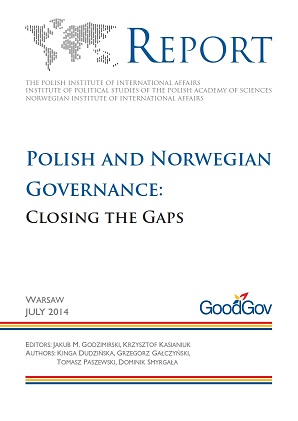Polish and Norwegian Governance: Closing the Gaps
Polish and Norwegian Governance: Closing the Gaps
Author(s): Kinga Dudzińska, Grzegorz Gałczyński, Tomasz Paszewski, Dominik Smyrgała
Contributor(s): Brien Barnett (Editor), Dorota Dołęgowska (Editor), Jakub M. Godzimirski (Editor), Krzysztof Kasianiuk (Editor)
Subject(s): Politics / Political Sciences, Politics, Social Sciences, Governance, Sociology, Environmental and Energy policy, Government/Political systems, International relations/trade, Security and defense, Migration Studies
Published by: PISM Polski Instytut Spraw Międzynarodowych
Keywords: Poland; Norway; government; governance vulnerabilities; international relations; bilateral relations; security; energy; migrations;
Summary/Abstract: The study shows that Poland and Norway have to cope with various governance vulnerabilities and face different challenges. Thus, both countries should adopt some country-specific and joint measures to reduce their governance systems’ exposure to the negative impact of unfolding domestic and international situations. According to the WGI assessment, Norwegian governance is much more effective than Poland’s. This suggests the possibility to transfer governance-related knowledge and best governance practices between Norway and Poland in such a manner that could help Poland close at least some of the identified governance gaps. Poland and Norway could and should further cooperate so as to have a potential positive impact on security, energy and migration in bilateral relations and at the EU level. On security, Poland and Norway have matching interests, as they are members of the same alliance but countries that need to import security, due mostly to their locations and lack of sufficient resources to cope with potential worst-case scenarios. They cooperate closely in the Alliance, have expressed similar concerns for its future, proposed similar solutions and face a resurgent and more confrontational Russia, one that has recently challenged the existing post-Cold War order in Europe with its annexation of Crimea.
Series: PISM Reports
- E-ISBN-13: 978-83-62453-95-5
- Page Count: 43
- Publication Year: 2014
- Language: English
- eBook-PDF
- Introduction
- Table of Content

